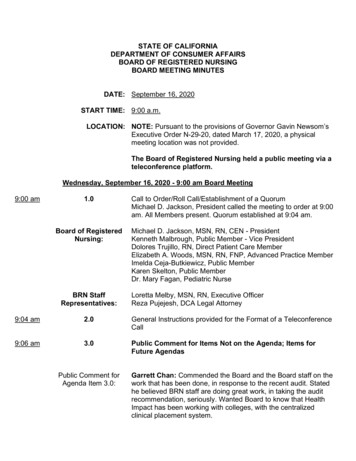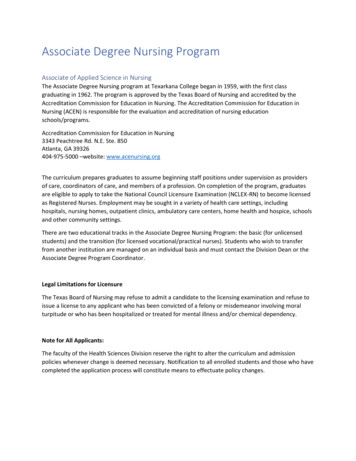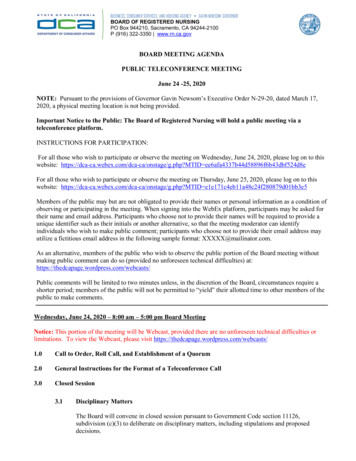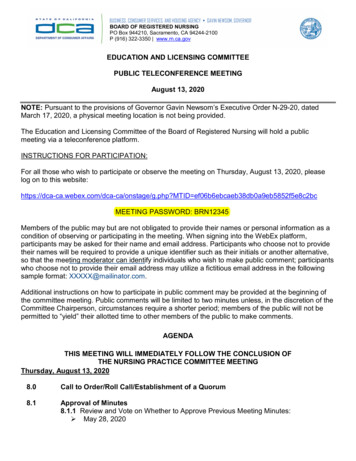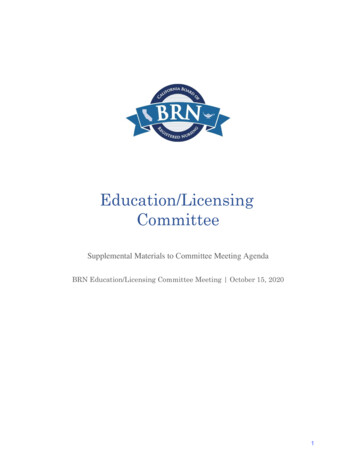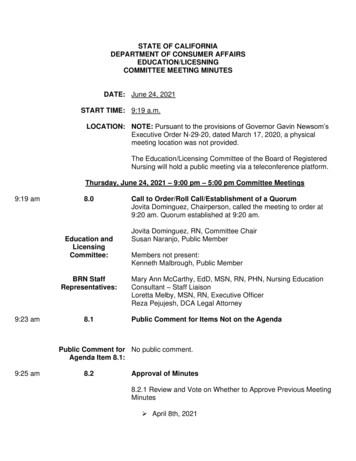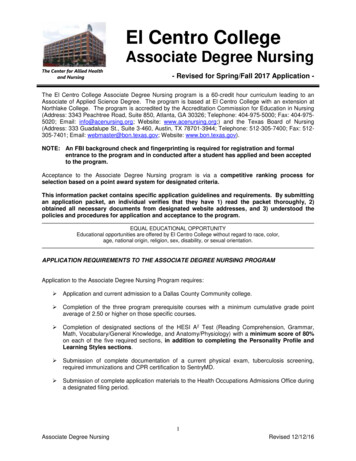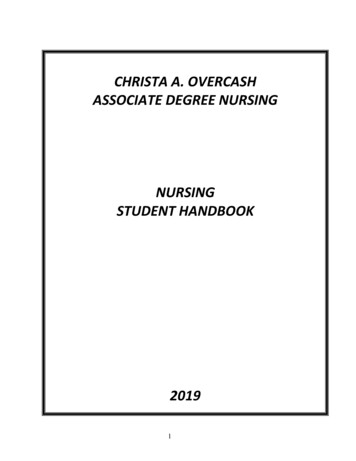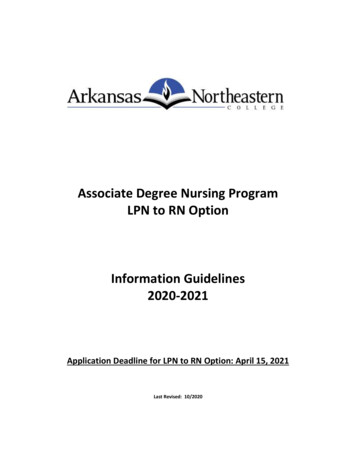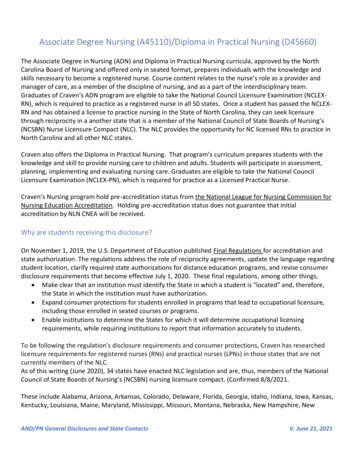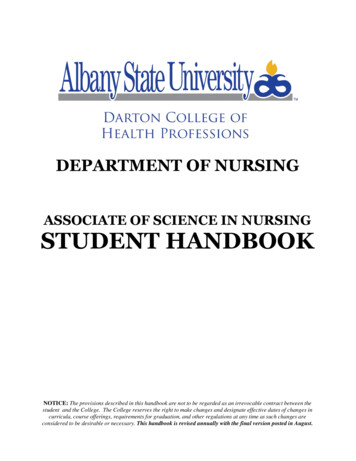
Transcription
Nursing and Allied Health DepartmentSchool of NursingStudent Policy and Procedure Handbook 2019-2020Revised July 2019
School of NursingStudent Policy and Procedure Handbook 2019-2020Acknowledgement of ReviewI(Print Name) have received, reviewed,and agree to follow the Nursing & Allied Health Unit, Student Policy & ProcedureHandbook.Student SignatureDateDuring your attendance in the Nursing and Allied Health Department, you will havemany questions. It is important to get the correct answer from the mostappropriate source. The policies and procedures written in this handbook aredesigned to assist students as they progress through the program and answersome of the most frequently asked questions. Contents presented in thishandbook are in accordance with the Mt. San Jacinto College Catalog, additionalstudent information is also available in the college catalog. Students will be notifiedabout any revision or creation of Policies and Procedures via student email.It is the students’ responsibility to review the Policy and Procedure changes whichwill be located on the following locations: NAHU website www.msjc.edu/alliedhealth Course Canvas Skills Lab CanvasThe Nursing and Allied Health Unit requires all students to check their assignedMSJC Student Email account daily (Monday-Friday) for important notices andannouncements.You will find current information posted about meetings, educational opportunities,employment opportunities, and scholarships on our website and on the Skills LabBlackboard.This handbook should be read carefully, saved, and used as a referencethroughout your attendance in the Associate Degree Nursing program.It is the student’s responsibility to notify the Nursing and Allied Health Office inwriting of any changes in address/telephone number/name change. If students donot keep the office advised of changes, the Nursing and Allied Health Unit will notaccept responsibility/liability.Revised: 5/2017Reviewed: 6/2018Reviewed: 7/2019
Mt. San Jacinto College School of NursingConsent for Release of InformationLast Name:First:Last four of SSN:DOB:MII, the undersigned, authorize Mt. San Jacinto College Associate Degree NursingProgram to release information regarding myself to the Board of Registered Nursingand all affiliated Clinical/Hospital Sites.All information will be kept confidential and maintained as part of my records withthe Mt. San Jacinto College. Additionally, all information will be used exclusively inthe administration or delivery of services.This release shall remain in effect while accessing any service from Mt. San JacintoCollege and throughout my enrollment and follow-up period under the AssociateDegree Nursing Program at Mt. San Jacinto College.Student SignatureDateMt. San Jacinto College School of NursingPicture Release FormI hereby consent to the use of all images (photographs, videotapes, or film) takenof me and/or recordings made of my voice and/or written extraction, in whole forMt. San Jacinto College and/or others with its consent, for the purposes ofillustration, advertising, or publication in any manner.Name:Student #:Street Address:City:State:Zip Code:Student SignatureTelephone Number:Date
Table of ContentsGeneral InformationAcknowledgement of ReviewConsent to Release Form/ Picture Release FormADN Mission StatementADN ContactsCommunication and Chain of CommandPhilosophyProgram Core ValuesProgram Core Values DefinitionsProgram Learning Outcomes (PLO)Course Learning Outcomes (CLO)/Student Learning Outcomes (SLO)Nursing Department ResourcesCollege Campus ResourcesTotal Curriculum PlanProgression through the programPromotion, Enrollment, Admissions, Retention (PEAR)Program Dismissal PolicyCommunication of Student Academic Failure/Dismissal PolicyExit Interview SummaryReadmission PolicyTransfer PolicyEssential Function Policy/Special NeedsCastleBranchPosition Statement Background CheckStudents with Prior ConvictionsCastleBranch Information SheetAmerican Heart Association CPR CertificationProgram Policies & ProceduresStudent CitizenshipUse of Technology and Social Media PolicyCode of EthicsAlcoholism, Chemical Dependency/Impairment, and EmotionalWellnessChemical Abuse PolicyClinical/Lab Site Injury/Pathogen Exposure PolicyIntegrityStudent Civility PolicyCode of Academic and Clinical ConductMSJC Standards of ConductDelivery of Health CareDelivery of Health Care to Patients with Communicable DiseaseStandard PrecautionsHand HygieneLatex Sensitivity PolicyStudent Injury, Illness or PregnancyAttendance PolicyClinical Make-up AssignmentClassroom and Clinical ExpectationsAcademic Dishonesty and PlagiarismAPA Style 41-42424344-4546474849-50
APA Formal Paper ChecklistGrading ScaleWeighted Course GradeExamination PolicyExam Day Guideline PolicyAbsences Related to ExaminationNursing Pharmacology and Dosage ExaminationRounding RuleATI Integration PolicyATI Proctored Exam ScheduleStrategic Plan for Success PolicyCommunity Service Events and ActivitiesGift PolicyNursing Skills LabNursing Skills LabTheory or Clinical CancellationTextbook Check-Out and UseSkills Check off PolicyThe Ten Critical BehaviorsSign-Up PolicyATI Ticket to TestThree Prompt PolicyCancellation of Skills Check Off AppointmentBlackboardClinical Policies & ProceduresClinical Outcome PolicyClinical Paperwork RequirementNursing Clinical- Ten Mandatory ElementsCriteria for Unsafe Clinical BehaviorCopying or Transmitting Client Records/ HIPAAMedication Administration GuidelinesSentinel Event PolicyIV Push PolicyClinical Evaluation Tool (Example)Assessment Rubric for Clinical Evaluation ToolUniform Dress CodeNursing Student Organization(s)South West Associate of Nursing Students (SWANS)SWANS Club Charter 2014-2015Other OrganizationsPeer TutoringPeer Tutoring GuidelinesPeer Mentor/Mentee Program GuidelinesPeer Mentor/Mentee ApplicationPeer Mentor/Mentee BrochurePromotion and CompletionPinning Ceremony HistoryPinning Ceremony PolicyPinning Ceremony Dress CodeGraduation and Candidacy for LicensureNCLEX Preparation InformationAdditional Information Regarding 18119-120120121
Mt. San Jacinto CollegeMission StatementAssociate Degree Nursing ProgramMission StatementMt. San Jacinto College offers accessible, equitable andinnovative educational programs and services to studentsaspiring to achieve their academic, career and personaldevelopment goals.We provide students a safe environment in which to pursuebasic skills, career and general education pathways. Ourprograms lead to transfer, associate degrees and certificateswhich meet workforce development needs in our diversecommunities.Our commitment to student success empowers students withthe skills and knowledge needed to participate meaningfullyin today’s complex world.(November 13, 2014)The mission of the Associate of Science DegreeNursing Program is to prepare entry-levelregistered nurses to function effectively withinnursing and inter-professional teams. Thesegraduates will deliver patient centered care toculturally diverse populations in a variety ofhealthcare settings. Graduates will be effectivecommunicators, and demonstrate a commitmentto lifelong learning.We respect the individuality of students andrecognize that each student has different learningstyles, educational, experiential, cultural, spiritual,economic and social backgrounds and a uniquesupport system. The goal of the program is topromote student success in a positive, innovativelearning environment that empowers students todevelop critical thinking and problem solving skillsto enhance clinical reasoning and decision makingthat result in positive patient outcomes.School of Nursing – Student Policy and Procedure Handbook 2019 - 2020Page 1
School of Nursing ContactsJoyce Johnson, MSN, RNDean, Nursing & Allied Health UnitCrystal Nasio, EdDAssociate Dean, Nursing and Allied Health (Interim)FacultyPeter Zografos PhD, RNDirector, School of Nursingpzografos@msjc.eduNicholas Garcia MSN, RNAssistant Director, ADN Facultyngarcia@msjc.eduSusan Farrington MSN, RNADN Facultysfarrington@msjc.eduAngela Feeler MSN, RNADN Faculty/Skills Lab Coordinatorafeeler@msjc.eduLaura Gibson PhD, RNADN Facultylgibson@msjc.eduVictoria Hayward MSN, RNADN Facultyvhayward@msjc.eduCharlene Le MSN, RNADN Facultycle@msjc.eduTracy Miller MSN, RNADN Facultytrmiller@msjc.eduDenise Roberts MSN, PHN, RNADN Facultydroberts@msjc.eduSeptember Cortes-Stankus MSN, RNADN Facultyscortes@msjc.eduAssociate FacultyStephen Anderson MSN, RNstanderson@msjc.eduCherrie Manuel Apostol MSN, RNcmanuelapostol@msjc.eduSean Cummings BSN, RNscummings@msjc.eduConnie Duncan-Moses RNcmoses@msjc.eduLinda Frazier MSN, RNlfrazier@msjc.eduMaria E. Garza BSN, RNmgarza@msjc.eduChristy Howe MSN, RNchowe@msjc.eduLidia Lopez BSN, RNllopez@msjc.eduSchool of Nursing – Student Policy and Procedure Handbook 2019 - 2020Page 2
Sarah Ledesma MSN, RNsaledesma@msjc.eduDonna Lundgren MSN, RNdlundgren@msjc.eduMary Moore-Hughes MSN, RN, PHN ADNmhughes@msjc.eduTuan Nguyen BSN, RNtunguyen@msjc.eduSusana Outlaw MSN, RNsoutlaw@msjc.eduLori Paschall MSN, RNlpaschall@msjc.eduDessia Stokes-Berry BSN, RNdestokes@msjc.eduMagdalena Suarez MSN, RNmsuarez@msjc.eduDustin Texeira MSW, RNdtexiera@msjc.eduNicole Thompson MSN, RNnthompson@msjc.eduTalitha Wells, RNtwells@msjc.eduShelly Wray BSN, RNswray@msjc.eduSupport StaffMain Line(951) 639-5577Kristin CastorenaNursing Student Program Specialist, School of Nursingkcastorena@msjc.edu(951) 639-5578Rachelle JackAdministrative Associate to the Associate Deanrjack@msjc.edu(951) 639-5561Janet BrandenburgClerical Assistant IV, Allied Health Programsjbrandenburg@msjc.edu(951) 639-5557Jamie OlmosNursing Student Counselorjolmos@msjc.edu(951) 639-5558Alma AlvarezCounselor, Nursing and Career Educationaalvarez@msjc.edu(951) 639-5558Janet EvansClerical Assistant II, Nursing and Allied Health Dept.jevans@msjc.edu(951) 639-5577School of Nursing – Student Policy and Procedure Handbook 2019 - 2020Page 3
Communication and Chain of CommandStudents have the opportunity to communicate their ideas, suggestions and/or concernsassociated with the Nursing and Allied Health Department by:1. Speaking directly with the Professor/Clinical Professor2. Speaking directly with the Program Director3. Attending Lunch with the Director4. Attending faculty meetings and having faculty student liaison5. Speaking directly with the Associate Dean of the Nursing and Allied Health DepartmentIf a student has a concern or a problem with a professor, the student is expected to approach theinvolved professor and arrange an appointment to discuss the issue. Matters relating to the clinicalarea should be discussed with that particular Clinical Professor and those matters dealing with aspecific lecture should be discussed with the lecturer.If the problem cannot be resolved, the student is advised to follow the appropriate chain ofcommand which is: Clinical or Lead Theory Professor, Assistant Program Director, ProgramDirector, Associate Dean of the Nursing and Allied Health Department.If the problem persists, the student is advised to follow the MSJC Catalog for the StudentComplaint Policy and Student Grievance Policy. See College Catalog for Board Policy 5500 andAdministrative Procedure 5500.School of Nursing – Student Policy and Procedure Handbook 2019 - 2020Page 4
PhilosophyPhilosophyThe philosophy of the Associate Science Degree, Registered Nursing Program focuses on the individualneeds of the students and patients, within the context of families, communities and environments whoexist on a health continuum. Learning occurs via a dynamic engaged process that prepares the studentto function effectively as an entry level registered nurse within nursing and inter-professional teams.Program Core ValuesThe Associate Degree Nursing program mission and philosophy statements align with the college missionand philosophy statement. The philosophy, Program Learning Outcomes, Student Learning Outcomes, andCore Values take into consideration the basic concepts of QSEN competencies:1.2.3.4.5.6.7.Nursing Role/LeadershipNursing ProcessPatient Centered CareCommunicationEvidence Based PracticeQuality Improvement/Fiscal ResponsibilitySafetySchool of Nursing – Student Policy and Procedure Handbook 2019 - 2020Page 5
Program Core Values DefinitionsCommunicationImplements therapeutic communication skills that foster open communication, mutual respect and shareddecision making to achieve quality patient careEvidence-Based PracticeIntegrates best current evidence with clinical expertise and patient/family preferences and values fordelivery of optimal health careNursing ProcessUses a systematic approach to assess, diagnose, plan, implement/intervene and evaluate patient care.Nursing Role/LeadershipUses the nursing roles of communicator, actively participates in implementing changePatient-Centered CareRecognizes the patient or designee as the source of control and full partner in providing compassionate andcoordinated care based on respect for patient’s references, values and needsQuality Improvement/Fiscal ResponsibilityUses data to monitor the outcomes of care processes and uses improvement methods to design and testchanges to continuously improve the quality and safety of health care systems. Recognizes that costeffectiveness is essential for success for the health care organizationSafetyMinimizes risk of harm to patients and providers through both system effectiveness and individualperformance.Quality Safety Education in Nursing accessed JuneReviewed JuneReviewed MayReviewed JuneReviewed JulySchool of Nursing – Student Policy and Procedure Handbook 2019 - 2020Page 620142016201720182019
Program Learning Outcomes Incorporate ethical, legal and safety standards and professionalism (Nurse Practice Act). Develop leadership skills and promote research/evidence based practice Design Problem Solving Plans (PSP) using the nursing process to direct and manage careof clients. Develop and utilize effective verbal and written communication methods that can be usedwith clients, family and health care professionals to promote optimum wellness and clientadvocacy. Incorporate principles of environmental, informatics, client and personal safety when usingthe nursing process to provide care for clients. Integrate knowledge of drug classifications used to promote, maintain, and restoreoptimum wellness. Synthesize growth and development concepts for the care of clients of various ages. Compare and contrasts the various, physical, social, cultural, and spiritual environmentsusing the nursing process to promote, maintain and restore optimum wellness Analysis of physiological needs for clients to promote, maintain and restore optimumwellness Prepare student for candidacy to take the National Council Licensure by Examination(NCLEX) and continue lifelong learning.School of Nursing – Student Policy and Procedure Handbook 2019 - 2020Page 7
Course/Student Learning Outcomes1. CommunicationImplements therapeutic communication skills that foster open communication, mutualrespect and shared decision making to achieve quality patient care.2. Evidence-Based PracticeIntegrates best current evidence with clinical expertise and patient/family preferences andvalues for delivery of optimal health care.3. Nursing ProcessUses a systematic approach to assess, diagnose, plan, implement/intervene and evaluatepatient care.4. Nursing Role/LeadershipUses the nursing roles of communicator, actively participates in implementing change5. Patient-Centered CareRecognizes the patient or designee as the source of control and full partner in providingcompassionate and coordinated care based on respect for patient’s preferences, valuesand needs6. Quality Improvement/Fiscal ResponsibilityUses data to monitor the outcomes of care processes and use improvement methods todesign and test changes to continuously improve the quality and safety of health caresystems. Recognizes that cost effectiveness is essential for success for the health careorganization7. SafetyMinimizes risk of harm to patients and providers through both system effectiveness andindividual performanceSchool of Nursing – Student Policy and Procedure Handbook 2019 - 2020Page 8
School of Nursing ResourcesNursing and Allied Health CounselorA dedicated Nursing Counselor is available for nursing students to assist with time management,study skills, Financial Aid, scholarships, transfer information, writing a resume, and other needswith regard to nursing student success. From day one, all nursing students are providedinformation about the Nursing Counselor and are encouraged to meet with the counselor, who islocated in the Nursing and Allied Health Department on the Menifee Valley Campus in Building500.ATI Integration PolicyThe Comprehensive Assessment and Review Program (CARP) is a learning program offered byAssessment Technology Institute (ATI) that provides students with focused testing utilizingresearch-validated practice examination questions and remediation tools/activities for eachnursing course in the Associate Degree Nursing Program. The CARP offers individual, self-paced,content specific and targeted remediation to increase student success. The CARP is used in theNursing Program to assist students with the application of theoretical content to actual client-caresituations and to facilitate NCLEX-RN Preparation.Skills LabThe Skills Lab is separated into four areas in the 500 building-rooms: 513, 514, 515, and 516.Three rooms are simulation rooms and one room is for student to check out computers and studyarea. The Skills Lab contains and continues to purchase a variety of audiovisual (AV) materials toaugment lecture presentations and provides students with opportunities for self-study.There1.2.3.4.5.6.are a variety of resources available for all nursing students:Skills practice with ProfessorSkills check-off with ProfessorComputer learning activitiesLaptop checkout and useSIM Man simulation activitiesComputer accessibility for online learning to access ATI Skills Modules and other webbased resources7. Reference Textbooks and Nursing journal articles (located in the Learning ResourceCenter/Library on the Menifee Valley and online library resources)School of Nursing – Student Policy and Procedure Handbook 2019 - 2020Page 9
South West Association of Nursing Students (SWANS)The SWANS Organization is a constituent of the National Student Nurses Association and CaliforniaStudent Nurses Association and practices shared governance. SWANS are student nurses unitingtogether to convey the standards and ethics of the nursing profession to become responsible andaccountable members of the nursing profession, to advocate for high quality, research-based,affordable and accessible healthcare to the community to strengthen the efforts of each individualstudent through mentoring and to develop into students who are prepared to lead the professionof nursing in the future.Peer Mentoring/Peer TutoringPeer mentoring is a subsidiary of the South West Association of Nursing Students (SWANS).The program is established to provide support and guidance to the nursing students from othernursing students’ perspective to achieve success. For more information, please emailmsjcadnmentoring@gmail.com (funded by the Song Brown Grant).California Collaborative Model of Nursing Education (CCME)The California Collaborative Model of Nursing Education provides a streamlined option for ADNstudents to obtain their BSN degree. This dual enrollment education pathway is a core strategywith statewide impact to advance nursing education. This model is specific to the articulationopportunities of students to attend Cal State San Marcos. The program has a variety of articulationagreements with a number of baccalaureate programs.School of Nursing – Student Policy and Procedure Handbook 2019 - 2020Page 10
College Campus ResourcesCounselingThe mission of the Mt. San Jacinto College Counseling Department is to facilitate proactiveplanning for student success, leadership and life-long learning through academic, career, transfer,personal, and crisis counseling. Counselors and staff advocate, educate, guide, and empowerstudents’ intellectual and social development within an educational and multicultural environment.DSPSDisabled Students Programs and Services (DSPS) is a program that assists students withdisabilities in gaining maximum access to college curriculum and programs while attaining theiracademic, vocational and personal goals in a mainstreamed setting. Students may be referred toDSPS by professors, counselors, community agencies, high schools, a parent, or by self-referral.Students are eligible for appropriate and reasonable accommodations and support services uponcompletion of an application, verification of the disability, and an intake interview in DSPS.Enrollment ServicesThe Enrollment Services Office provides numerous services to students and members of thecommunity. General information about the college is provided. Petitions to enroll in class after thetraditional enrollment dates, transcripts, credit by examination and enrollment verification are allinitiated in this office. Student academic records, courses taken, units attempted, units earned,grades, grade points, graduation date and other data are maintained in this office.EOPSThe Extended Opportunity Programs & Services (EOPS) was established as a result of AssemblyBill 164 passed by the California Legislature in 1969 to increase the enrollment of educationallydisadvantaged and low-income students on community college campuses.Financial AidWhile Mt. San Jacinto College subscribes to and supports the philosophy that primary responsibilityfor funding college expenses rests with students and their families, the college recognizes thatsome students and/or their families have limited financial resources and are unable to meet all ofthe expenses associated with higher education without supplemental assistance.School of Nursing – Student Policy and Procedure Handbook 2019 - 2020Page 11
ScholarshipsScholarship TitleCOADN LeadershipScholarshipDiscover Nursing ScholarshipSearchFlo’s Cookie Jar (NSNA)Health Professions EducationFoundationHealth ProfessionalsScholarship ProgramHemet Sunset Rotary ClubHispanic Scholarship FundApplicationInformationApplication FlyerWebsiteWebsiteWebsiteWebsiteHPSP Fact SheetWebsiteTBAWebsiteJapanese American CitizensLeagueNSNA ScholarshipWebsiteSharps Compliance EssayContestFact SheetTylenol Future CareScholarshipUnited Negro College FundWebsiteDeadlineReview COADN website forupdatesUse website to search forscholarshipsReview websiteMultiple Scholarships, ReviewwebsiteReview website for moreinformationTBAMultiple Scholarships, ReviewwebsiteVaries based on eligibilityMultiple Scholarships, ReviewwebsiteReview WebsiteWebsiteWebsiteApplication Period April 15-June15Multiple Scholarships, ReviewwebsiteWebsiteFor additional scholarships, visit the MSJC Scholarship page located on the Financial Aidwebpage.Puente ProjectPuente is an academic, counseling, and leadership program that prepares students to succeed inthe university environment. The course curriculum and content is multi-cultural, emphasizingMexican-American/Latino experiences and literature. The students visit university and collegecampuses. The program starts every fall and runs through the spring semester.Veterans ServicesMt. San Jacinto College is fully approved for the training of students under the various governmenteducational programs for veterans and eligible dependents of deceased or disabled veterans. Afterfiling an application for admission, a veteran wishing to receive one of the VA Educational Benefitsshould contact the VA representative on the campus of their choice (SJC/MVC).Matriculation services were mandated in 1986 with the passage of AB3, a bill created to addressthe high dropout rate of community college students by offering services to assist students incompletion of their educational goals.School of Nursing – Student Policy and Procedure Handbook 2019 - 2020Page 12
Job Location Development Program (JLDP) is set-up to assure that students are successfulin their education and work-related activities while they remain in the program. Job PlacementServices offers several important services: Job OpportunitiesJob Skills/KnowledgeInternship ReferralsPortfolio DevelopmentResume BuildingEmployment ResourcesWorkshopsThe office maintains a wide variety of job listings in all areas, which are posted daily. Studentsmay also do a job search via the Internet using Cal JOBS and other websites. A large number ofresources to assist students are available on careers, interviewing techniques, resume writing andjob market projection. These include computer programs, videos, books, and other writtenmaterials. Helpful staffs are always available to get students started on their career explorationjob search.School of Nursing – Student Policy and Procedure Handbook 2019 - 2020Page 13
Mt. San Jacinto College Associate of Science DegreeTOTAL CURRICULUM PLANNOTE: All courses must be completed with a grade of “C” or higherCOURSE NUMBERFIRST SEMESTERNursing 194(18 weeks)Nursing 212(9 weeks)Nursing 214(9 weeks)Nursing 071(18 weeks)SECOND SEMESTERNursing 222(9 weeks)Nursing 224(18 weeks)Nursing 226(9 weeks)Nursing 072(18 weeks)THIRD SEMESTERNursing 234(18 weeks)Nursing 236(9 weeks)Nursing 238(9 weeks)Nursing 073(18 weeks)FOURTH SEMESTERNursing 244(9 weeks)Nursing 248(9 weeks)Nursing 074(18 weeks)LVN-RN ROLETRANSITIONNursing 232(18 weeks)Nursing 072(18 weeks)COURSE s of Nursing436108Introduction to Medical-Surgical Nursing I436108Foundations of Nursing Skills Lab0.5027Nursing Care of Children and Families3.53681Beginning Medical-Surgical Nursing II545135Nursing Care of Childbearing Families3.53681Basic Medical Surgical Nursing Skills Lab0.5027Intermediate Medical-Surgical Nursing III545135Mental Health Nursing32781Gerontology and Community ed Nursing Skills Lab0.5027336540.5027Pharmacology and Dosage Calculationsfor NursesIntermediate Nursing Skills LabAdvanced Medical-Surgical Nursing IVLVN-RN Role TransitionBasic Medical Surgical Nursing Skills LabSchool of Nursing – Student Policy and Procedure Handbook 2019 - 2020Page 14
Progression Through The Associate Degree Nursing ProgramLVN-RN TRANSITIONN232: Role TransitionTheory and Clinical(18 Weeks)January-MayN072: Basic Medical-Surgical Skills Lab(18 Weeks)January-MayFIRST SEMESTERN194: Pharmacology & Dosage Calculations forNursesTheory(18 Weeks)N212: Foundations of NursingTheory and Clinical(9 Weeks)THIRD SEMESTERN214: Introduction to Medical-Surgical NursingTheory and Clinical(9 Weeks)N071: Foundation of Nursing Skills Lab(18 Weeks)N234: Intermediate Medical-Surgical Nursing IIITheory and Clinical(18 Weeks)N236: Mental Health NursingTheory and Clinical(9 Weeks)N238: Gerontology and Community NursingTheory and Clinical(9 Weeks)N073: Intermediate Nursing Skills Lab(18 Weeks)SECOND SEMESTERN224: Beginning Medical-Surgical Nursing IITheory and Clinical(18 Weeks)FOURTH SEMESTERN226: Nursing of Childbearing & Families (OB)Theory and Clinical(9 Weeks)N244: Advanced Medical-Surgical Nursing IVTheory and Clinical(9 Weeks)N222: Nursing Care of Children & Families(Pediatrics)Theory and Clinical(9 Weeks)N248: PreceptorshipClinical(9 Weeks)N072: Basic Medical-Surgical Skills Lab(18 Weeks)N074: Advanced Nursing Skills Lab(9 Weeks)School of Nursing – Student Policy and Procedure Handbook 2019-2020Page 15
Promotion, Enrollment,Admission, Retention(PEAR)School of Nursing – Student Policy and Procedure Handbook 2019-2020Page 16
Program Dismissal PolicyAll students that exit the program are responsible for dropping all nursing courses throughEagle Advisor. The following causes shall be sufficient for immediate dismissal:1. Professionalisma. Documented and counseled consistent account of poor personal hygiene.b. Documented and observed cheating or plagiarism in the classroom and/or clinicalpractice settings.c. Insubordinate attitude or comments to faculty and/or staff.d. Noncompliance with program policies, procedures, and/or strategic plans.e. Unethical or inappropriate conduct/incivility in the classroom and/or clinicalpractice settings.f. Documentation of behavior consistent with substance abuse.g. Use of alcohol or abuse of drugs.h. Verbal or physical assault/abuse.i. Documented and observed bullying and/or cyberbullying.j. Refusal or timely compliance with random drug testing requirement.2. Clinical Performancea. Unsafe performance in the classroom and/or clinical practice settings.(See UNSAFE CLINICAL BEHAVIOR CHART WITH EXAMPLES)b. Inconsistent performance in delivering patient care.c. Unsatisfactory/inappropriate recording and reporting and inaccuratedocumentation.d. At any point in the semester, failure to complete clinical objectives.e. Insubordination or incivility to clinical professors other students, or clinical faculty,and hospital staff.3. Attendancea.Illness, mental or physical, deemed sufficient to interfere with the student’sability to complete objectives.b.Excessive absence or tardiness, as defined by the Attendance Policy.4. Any other reason enumerated in the student conduct section of the collegecatalog.School of Nursing – Student Policy and Procedure Handbook 2019-2020Page 17
Communication of Student Academic Failure/Dismissal PolicyCourse exam grades will be posted at the discretion of the faculty member. If a studentfails a course, the professor is expected to follow these procedures: Contact the Director with the name of the students that have failed. Dire
Kristin Castorena Nursing Student Program Specialist, School of Nursing kcastorena@msjc.edu (951) 639-5578 Rachelle Jack Administrative Associate to the Associate Dean rjack@msjc.edu (951) 639-5561 Janet Brandenburg Clerical Assistant IV, Allied Health Programs jbrandenburg@msjc.edu (951) 639-5557 Jamie Olmos Nursing Student Counselor jolmos .
